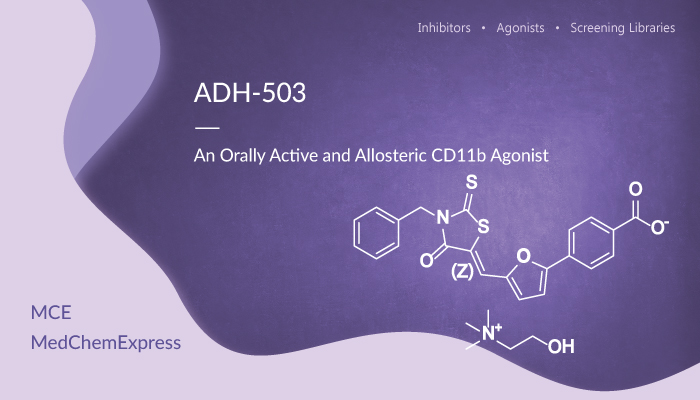Pancreatic ductal adenocarcinoma (PDAC) is characterized by abundant myeloid cell infiltrates. The immunosuppression, fibrosis, T cell dysfunction, and poor prognosis in patients with PDAC associate with these infiltrates. The cells in these infiltrates rely on cell adhesion molecules for both their trafficking into tumors and their biological activity. Integrin αMβ2 (CD11b/CD18) is a multifunctional integrin. It plays a well-established role in leukocyte adhesion to the vasculature, transendothelial migration, and tissue recruitment under inflammatory conditions. CD11b is the ligand binding subunit of the dimeric integrin CD11b/CD18 and a receptor for both fibrinogen and endothelial intercellular adhesion molecule–1 (ICAM-1). Thus, CD11b also plays a key role in the phagocytosis of opsonized particles, including apoptotic cells, which can limit inflammatory immune responses. In this study, ADH-503 is an orally active and allosteric CD11b agonist.
ADH-503 can activate CD11b, and leads to the repolarization of tumor-associated macrophages, reduction in the number of tumor-infiltrating immunosuppressive myeloid cells, and enhances dendritic cell responses. Furthermore, it binds CD11b and reduces myeloid cell recruitment to PDAC tissues. Moreover, ADH-503 results in the repolarization of macrophages toward a phenotype that could support antitumor T cell responses. ADH-503 treatment induces the accumulation of CD103+ cDCs in the tumor. In addition, ADH-503-induced improvements in cDC1 responses are critical for the orchestration of antitumor CD8+ T cell immunity and tumor-restraining treatment efficacy. It enhances the efficacy of standard-of-care therapies to eliminate metastasis.

In summary, ADH-503 is an orally active and allosteric CD11b agonist. ADH-503 leads to the repolarization of tumor-associated macrophages, reduction in the number of tumor-infiltrating immunosuppressive myeloid cells, and enhances dendritic cell responses.
Reference:
Panni RZ, et al. Sci Transl Med. 2019 Jul 3;11(499).